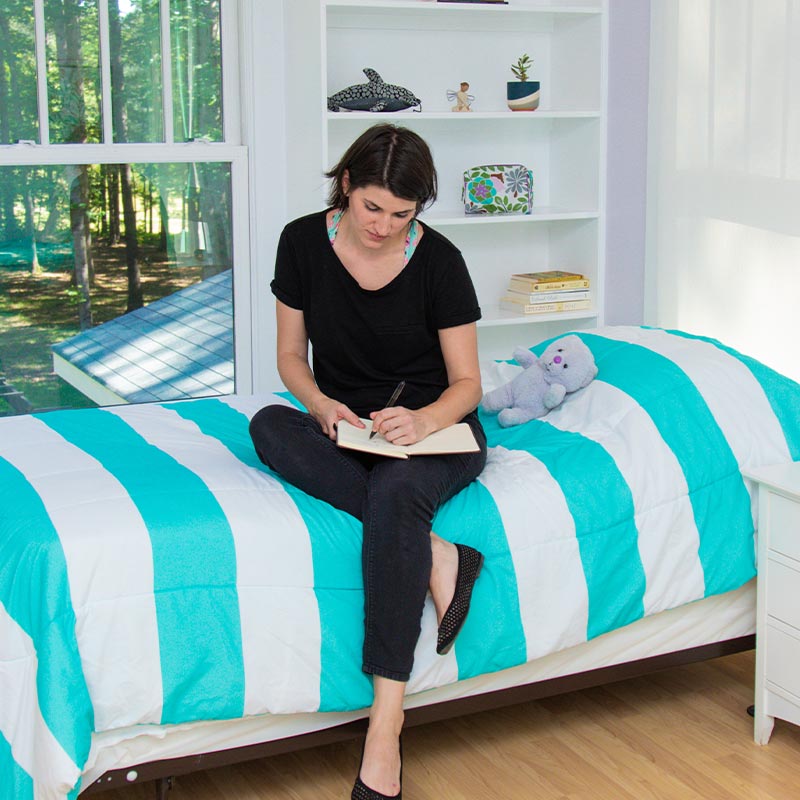Carolina House is committed to being a trusted provider of comprehensive behavioral healthcare for adults in Durham, North Carolina, and the surrounding areas. As part of our full continuum of services, we are pleased to offer gender-inclusive residential programming for adults age 18 and older who are struggling with symptoms of primary mental health concerns.
Learn About Our Residential Mental Health Program
Our residential program provides a supportive environment where individuals can receive focused care to help them build a foundation for better health. In a homelike setting, we deliver well-rounded care to help those in need stabilize and prepare for the next phase of their healing journey.
Residential programming is available for individuals who are struggling with a range of mental health concerns, including:
- Anxiety
- Depression
- Bipolar disorder
- Trauma-related disorders
- Obsessive-compulsive disorder
Clients typically spend an average of three to five weeks in our residential program. However, we strive to ensure that each person has the time they need to make sustained progress toward wellness, so the actual program duration may vary. We work closely with each client to assess their needs and determine the length of stay that can help them achieve optimal outcomes.
Who Can Benefit from Residential Programming for Mental Health Concerns?
In residential programming, we provide intensive support that may be essential for some individuals to achieve and maintain well-being. Our residential program for mental health concerns can be highly beneficial for those who:
- Are struggling with symptoms that have impaired their ability to function on a daily basis
- Are having a mental health crisis, such as experiencing suicidal thoughts or severe emotional distress
- Need close monitoring and adjustment of psychiatric medications
- Have not responded to outpatient therapy and require more structured support to achieve their goals
- Are suffering from the effects of trauma
- Need an escape from the stresses of daily life to focus entirely on their mental wellness
If you can benefit from our mental health residential program, contact us today. We will conduct an initial screening to determine the level of care that can help you begin to feel more like yourself again.
What To Expect in Our Residential Program for Mental Health Concerns
At Carolina House, we believe that an integrated approach is the best way to treat mental health conditions. That’s why we’ve brought together a highly experienced team, including a psychiatric provider, a medical provider, therapists, dietitians, a yoga therapist, behavioral health associates, and nurses, to support our clients as they work toward healing.
Our staff works collaboratively to deliver compassionate, round-the-clock care to help those in need overcome challenges and develop important skills that promote well-being.
In addition to 24/7 support, clients can expect the following in our residential program:
- A comprehensive assessment: Each client completes a thorough evaluation of their mental and physical health history, current symptoms, preferences, and program goals. This assessment helps us better understand each person’s needs so that we can tailor their care accordingly.
- A structured daily schedule: Individuals in our program follow a regimented schedule that includes therapies, services, activities, meals, and free time. Schedules provide clients with structure and predictability, which can reduce uncertainty and the stress that comes with it.
- Individualized care plans: Each person’s healing journey is unique. At our residential facility, clients receive care that is customized to meet their needs.
- A holistic approach to care: In our program, we incorporate holistic practices such as mindfulness, nutrition education, and recreational activities. These elements support overall well-being and enhance the healing process.
- Family involvement: We encourage active involvement from loved ones as needed. Family members may join therapy sessions so that they can better understand how to support their loved ones during the healing process.
- Nutritional support: Clients may receive a nutrition assessment from a registered dietitian. Balanced meals are provided, and nutrition education may be included to help ensure that clients maintain a healthy diet, which is important for mental wellness.
- Recreational activities: Clients may participate in recreational activities like art therapy and yoga as part of their individualized care plan. These activities can help reduce stress and improve mood.
- A detailed aftercare plan: We provide each client with comprehensive discharge planning. Customized continuing care plans can include recommendations for follow-up therapy, outpatient services, and local support groups, as well as other resources that promote long-term success.
Therapies & Services Offered in Our Residential Mental Health Treatment Program
Our residential program is based on a foundation of clinically excellent, individualized care. So that we can provide intensive programming that is tailored to each person’s unique needs, each client completes a thorough assessment with our team before they receive care.
The evaluation helps us get to know each person individually so that we can better understand the challenges they are facing. Using the details we gather during this assessment, we can customize their care in a way that can help them achieve the desired outcomes.
Personalized care plans include:
- Medical care: Nurses and medical providers deliver basic medical care as needed.
- Medication management services: All clients will meet with a psychiatric provider weekly.
- Individual therapy: In individual sessions, master’s-level clinicians help clients set short- and long-term wellness goals. Therapists update each client’s care plan and discuss progress with them weekly.
- Family therapy: Family counseling may include parents, extended family, siblings, spouses, guardians, significant others, and children. These sessions, which are offered weekly, can help families improve their communication skills, resolve conflict, and strengthen their relationships.
- Nutrition therapy: Nutritional support is available for our clients on an individual basis. Understanding the importance of proper nutrition for overall health is crucial to the healing process. Our registered dietitians are available to provide assessments, consultations, and individualized nutrition plans, support, and resources.
- Group therapy: Group therapy can help clients develop new, productive ways of coping. Group sessions are offered multiple times daily and include art and movement therapy, cognitive behavioral therapy, task-oriented, psychoeducational, recreational, and process groups. Led by master’s-level clinicians, nurses, dietitians, and yoga therapists, group sessions give clients an opportunity to gain valuable insight into a variety of topics while making meaningful connections with peers.
Our staff incorporates the following evidence-based practices into therapy sessions:
- Cognitive behavioral therapy (CBT): CBT is a type of psychotherapy that can help people understand how their thoughts are connected to their emotions and behaviors. It teaches individuals that by changing negative thought patterns, they can improve how they feel and behave.
- Dialectical behavior therapy (DBT): DBT is a form of therapy that can help people learn to accept their experiences and emotions while making positive changes. Through DBT, individuals can learn to regulate emotions, develop effective coping skills, and enhance interpersonal relationships.
- Motivational interviewing: A person-centered form of counseling, motivational interviewing is designed to strengthen a person’s internal motivation and commitment to their goals.
- Trauma-informed therapy: Trauma-informed therapy emphasizes the complex impact of trauma on a person’s well-being and their ability to cope. It can help those who are struggling with the effects of trauma regain a sense of control and work toward healing.
- Systemic therapy: Systemic therapy emphasizes the interconnected nature of an individual’s personal relationships, behavior patterns, and life choices with the challenges they are facing.
Why Choose Our Residential Mental Health Treatment Program
Choosing the right mental healthcare provider is a crucial step toward getting the help you need. At Carolina House, our experienced team is dedicated to helping each person we serve achieve sustained and holistic well-being.
We take a compassionate, evidence-based approach to care, and we are committed to forming relationships with our clients that are founded on dignity and respect. Our team acknowledges the impact mental health concerns can have on the lives of our clients, and we deliver care with the utmost empathy and understanding.
By choosing our residential program for mental health concerns, you are choosing a path to healing with a team that is dedicated to helping you live a happier, more fulfilling life. We will strive to empower you to envision a brighter future and ensure that you have access to resources that can help you remain successful long after you leave our program.
For more details about our residential program for mental health concerns, we encourage you to reach out to a member of our admissions team. Our admissions team is available Monday-Friday from 8:30 a.m.-8:30 p.m. ET to answer any questions you may have and/or schedule an assessment.
If you are struggling with symptoms of mental illness, seeking early intervention can greatly improve outcomes of care. Contact us today to learn more about the benefits of our residential program and how we can help you take the first step toward a healthier future.











